If you love cooking with fresh culinary herbs, you will love how easy growing herbs indoors can be. There is nothing like cutting your fresh herbs to add to your recipes! Here are my favorite fresh herbs you can grow indoors in your kitchen window!
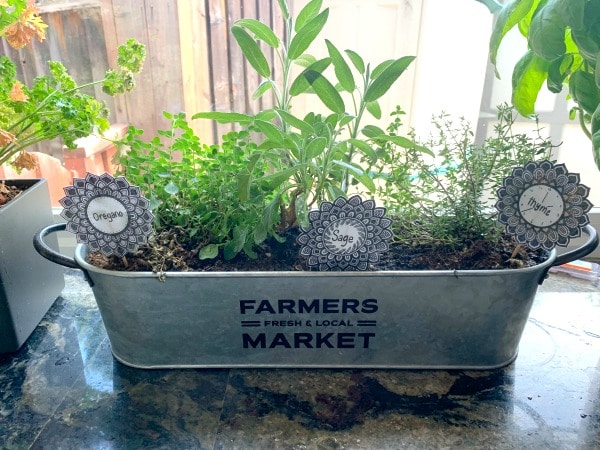
This post may contain affiliate links. Please read our Disclosure Policy.
Don’t forget to check out my post on how to use fresh herbs in your cooking. It has tons of mouthwatering recipes for you to make!
If you are new to gluten free living, don’t forget to check out my easy tips for gluten free living to help you both learn to cook and bake gluten free, but it will also give you tips to dine out safely in restaurants too!
This is my kitchen window :-). My daughter made me this fabulous indoor herb garden and drew cute mandala labels as a gift. Here are some cute windowsill garden boxes to grow your herbs in. Growing herbs in pots means a lot less mess!
Common Herbs for Cooking
There’s nothing quite like the taste of fresh herbs in recipes you cook and bake. You can enjoy that great taste anytime if you’re lucky enough to have an herb garden. What do you do if you don’t have space for a garden outdoors? Grow them indoors!!
Growing Herbs Indoors
Most herbs easily grow indoors in small areas such as kitchen window sills. Herbs need warmth, sunlight, and water if you want these plants to thrive. (Remember that if your kitchen doesn’t have enough natural sunlight during the day, you can also place the herb containers in rooms with better natural sunlight.)
When considering what herbs to grow, you will want to look for herbs that will remain relatively small. Herbs that are wide or tall may not fit in the area you’ve chosen to grow them. You’ll also want to consider the type of cooking you do most often and choose herbs that will match that type of cooking.
Herb seeds and seedlings can be found at many discount stores, grocery stores, and farmer’s co-ops. If you choose to grow your herbs from seeds, follow the instructions on the packet to plant them. Before you know it, you’ll have fresh herbs to harvest and enjoy in your home-cooked meals!!
What Herbs Are Best For Growing Indoors:
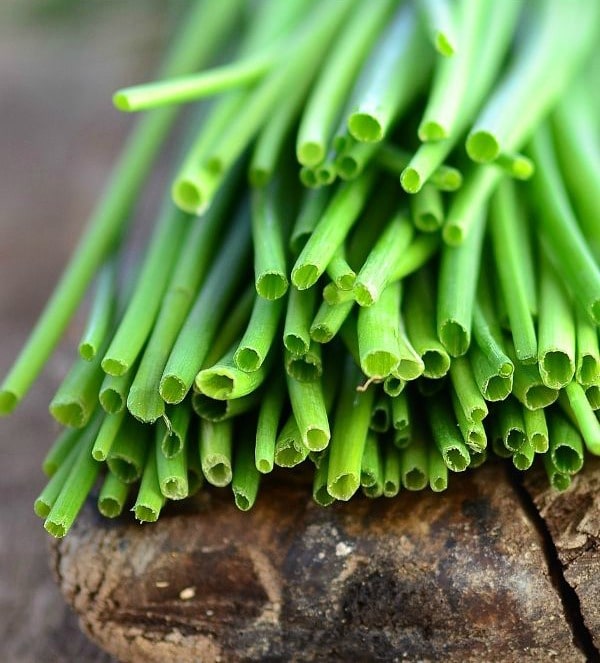
Fresh Chives
Chives taste like a combination of garlic and onions. They can be added to homemade salad dressing, sour cream, soups, or even ground hamburger or turkey meat. You may want to substitute chives for onions in some recipes to give your food a different flavor profile.
Chives are very easy to grow and can be started from seeds easily. When I need chives, I take my kitchen shears and chop off what I need. Use a sharp knife to dice it, then.
You will love the chives in these Curried Sweet Potato Hashbrown Waffles. We also love to add chives to these Twice Baked Potatoes!

Fresh Basil
Basil is used in many ethnic foods, such as those from Italy and Thailand. If you’re preparing a dish with tomatoes, basil is a natural herb to choose from. There are several varieties of basil to choose from, including the most commonly used: sweet basil, lemon basil, and Thai basil.
Basil can get leggy, meaning the stalks have very few leaves. To prevent this, pinch the tops of the stalks and remove the tiny new leaves. This will encourage more bushy growth and more leaves to use in recipes.
Try fresh basil in this Baked Ziti Casserole or this incredible Steak with Basil Garlic Sauce.
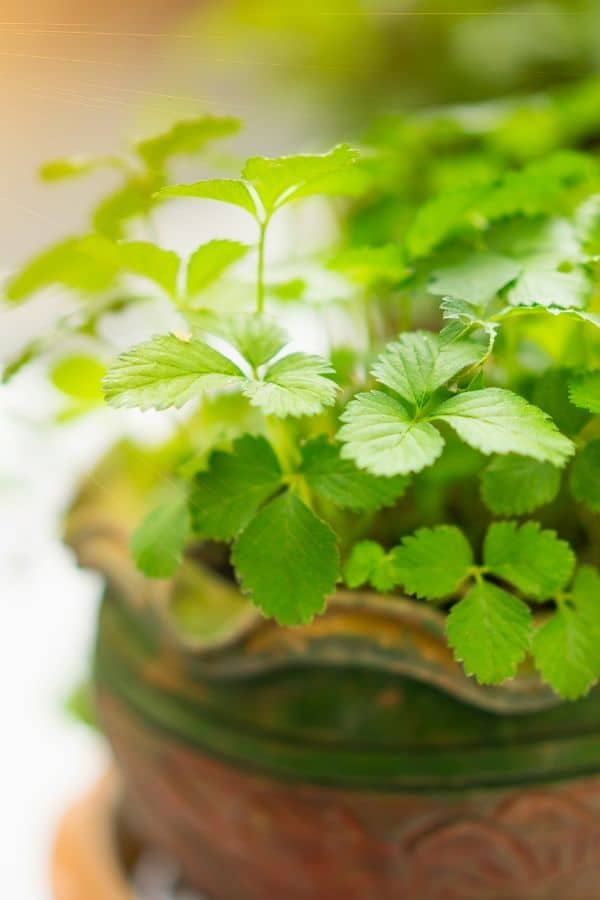
Cilantro (aka Coriander)
Cilantro is another herb that can be grown easily from seeds. My son likes to scatter cilantro seeds in our garden box, so we have cilantro year-round. It grows well either indoors or outdoors.
Depending upon whether you’re using the leaves or allowing the herb to go to seed, you can easily add cilantro to Mexican, Thai, and Indian cuisines.
If you love cilantro as much as we do, try it in this Tequila Lemonade Cocktail! Cilantro is also delicious in a soup like this Chicken Taco Soup.
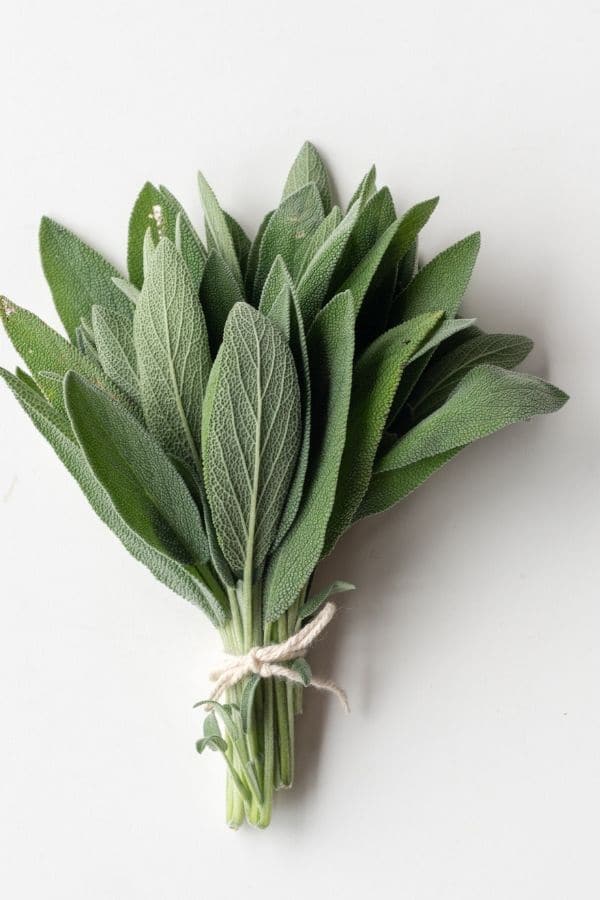
Fresh Sage
Cooking with sage is one of my favorites. Sage has a mild, herby-sweet flavor that goes beautifully with poultry. Sage, thyme, and rosemary make a delicious flavor combination packed under the skin, like in my Roasted Chicken recipe or Air Fryer Turkey Breast recipe.
Sage is a perennial herb that grows quickly; as the leaves get larger, their flavor strengthens.
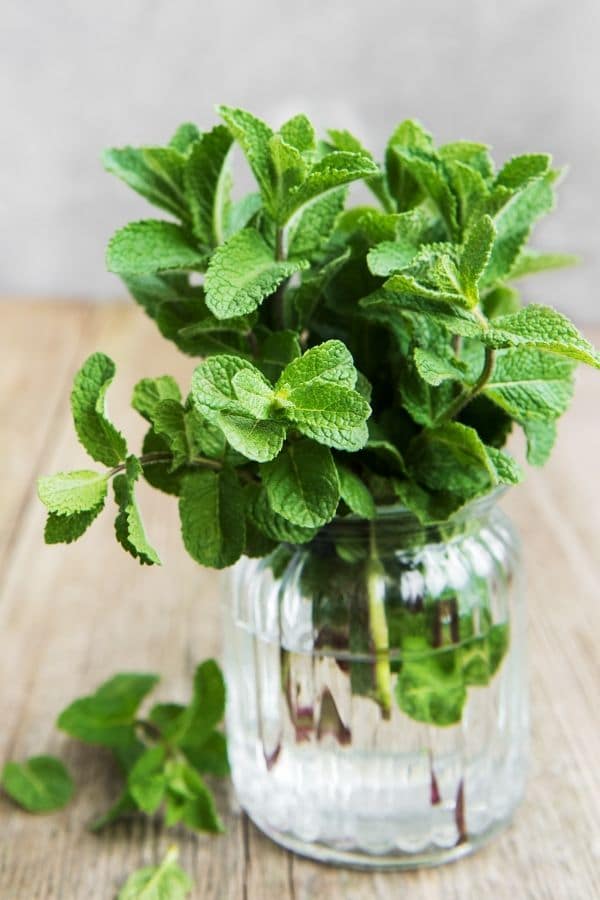
Mint (Peppermint or Spearmint)
Mint is a wildly popular herb that is used in a myriad of cuisines. If you live in the South, I bet you add it to your iced tea. You can also use mint in salads, jellies, and desserts. A coffee chain called Philz Coffee makes cold iced coffee packed with fresh mint leaves. It is so refreshing!
Mint is easy to grow and can be started as seeds or seedlings. Note: mint spreads a LOT when growing, so if you plant it outside, give it plenty of room. Peppermint is known to soothe the stomach and is as delicious as hot (or iced) tea.
Use fresh peppermint in this Fresh Mint Ice Cream or this Mint Simple Syrup, which is amazing in cocktails!
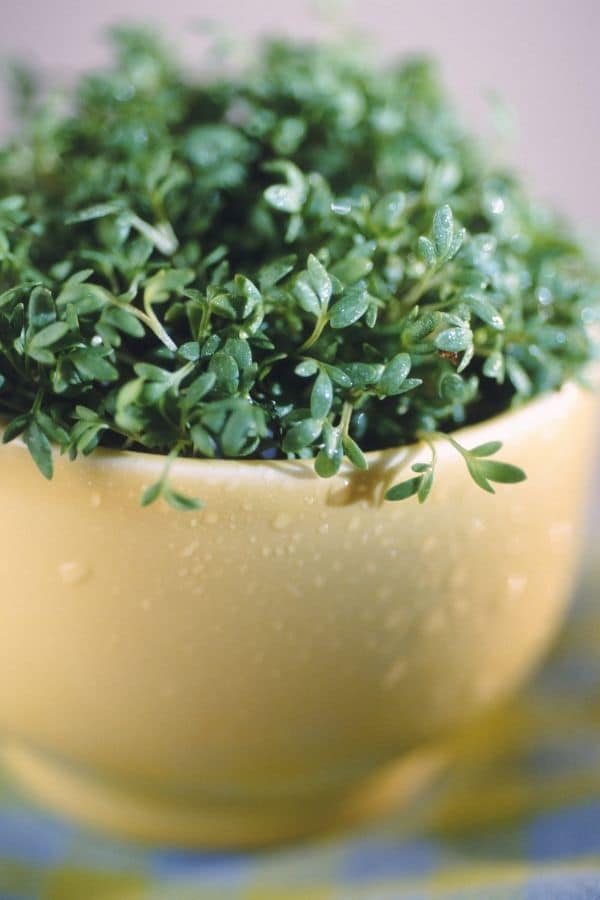
Fresh Thyme
Thyme is often used when cooking meat dishes. Thyme has a rustic flavor that works with chicken, pork, fish, and red meats. You can combine thyme with fruits, like in this Olallieberry Thyme Sauce. It tastes fantastic on these Grilled Pork Chops.
It is best to start these out as seedlings so you can have lots of this herb as quickly as possible. To cut off some thyme for a recipe, use kitchen shears to trim what you need.
Try using fresh thyme in my Air Fryer Cornish Game Hens recipe for a deliciously easy meal.
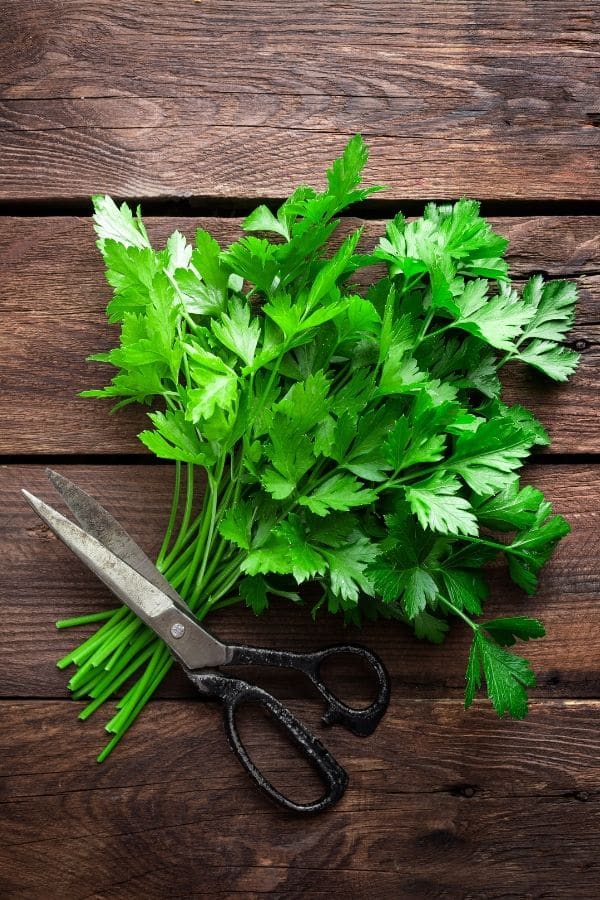
Fresh Parsley (Curly Leaf or Flat Leaf)
Parsley is one of the more widely used herbs. It is not only added to dishes for flavor but also makes a beautiful garnish. Parsley is nutrient-packed and is a great source of Vitamin C and folic acid.
Add parsley to one of these delicious soup recipes for a delicious meal. I hope you are seeing the benefits of growing fresh herbs indoors:-). Fresh parsley adds flavor to my Gluten Free Deli-Style Macaroni salad recipe.
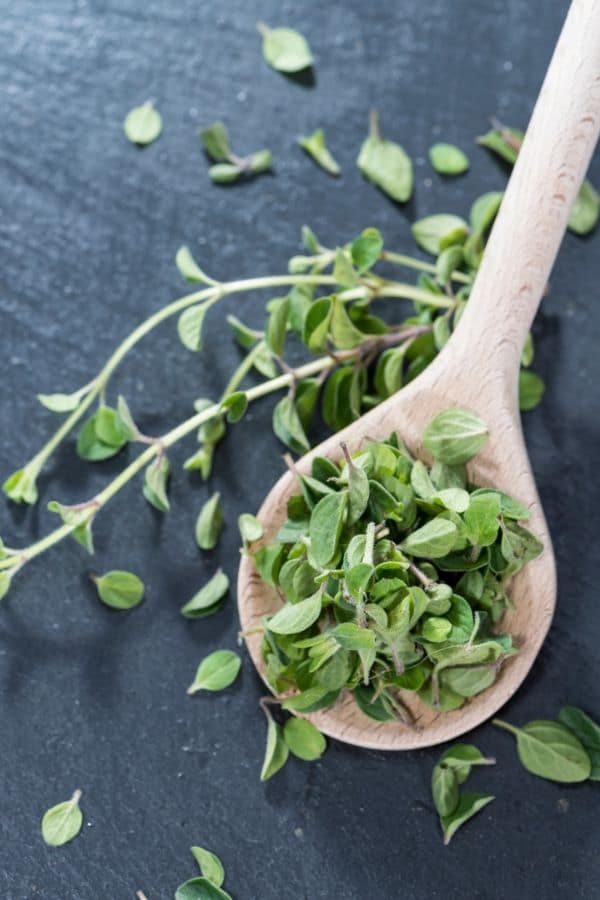
Fresh Oregano
Oregano is known as an Italian herb. It is used a lot in Italian cooking and sauces. Oregano is both a culinary herb and a medicinal herb. Oregano loves the sun, so ensure it has a nice sunny windowsill. Once the plant has grown about four inches tall, you can pinch the ends to keep it busy and avoid legginess.
You will love the oregano flavor in this tasty Pasta Sauce with Meat recipe. Oregano is also a star in my Homemade Pizza Sauce recipe.
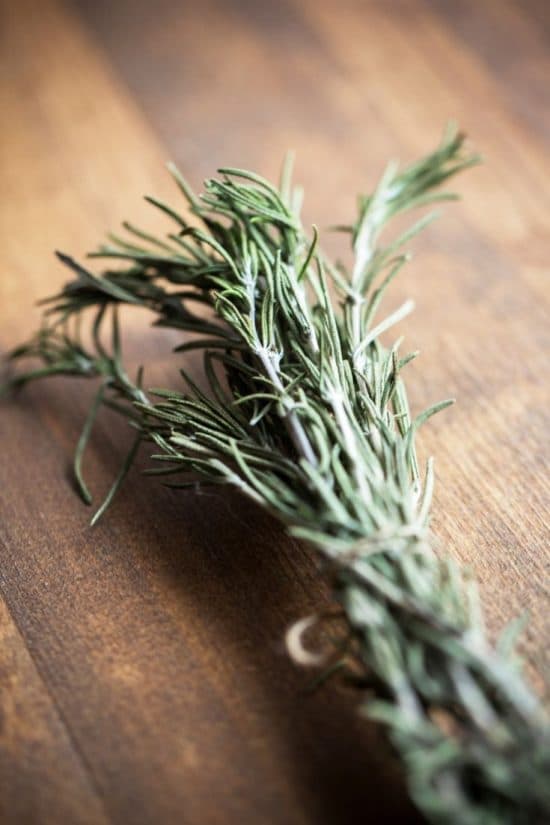
Fresh Rosemary
Cooking with rosemary is one of my favorites. Rosemary is fun to grow in your kitchen; many people use it as shrubbery in their gardens. Rosemary has a strong flavor that is perfect for meats and fish. You can even use it in your baking.
Give these Gluten Free Cheddar Herb Scones or my Gluten Free Focaccia a try! They are delicious dipped in a beef stew!
Fresh Herbs vs. Dried Herbs:
You can use dried herbs if you don’t have fresh herbs. The dried herb to fresh herb ratio is about 3 fresh to 1 dried. Dried herbs have a much stronger concentrated flavor than fresh herbs, so you need to triple the number of herbs a recipe calls for if you are using fresh herbs.
Frequently Asked Questions About Herbs:
I keep my herbs fresh by keeping them in their planter as long as possible. I snip off herbs as I need them. If you keep your herbs in the window as I do, you must water them often. I need to water my fresh herbs every other day because our kitchen bay window gets direct sunlight.
If your herbs were not growing and were cut from their roots, you can store them upright in a glass of water. They should stay fresh for 3-5 days.
Herbs are preserved very well when frozen. Cilantro can easily be frozen either in water or oil.
1. To freeze in water, add fresh herbs to an ice cube tray and fill it with purified water. Freeze. When the herb cubes are frozen, move the cubes to a freezer bag.
2. If you prefer to freeze your herbs in oil, the process is the same as above. Add your fresh herbs to the ice cube tray. Top each cube section with high-quality olive oil and freeze.
Recommended windowsill herb planters and seed kits:
- Organic Home Garden Kit
- Ceramic Herb Planters
- Organic Heirloom Herb Seeds – 8 different types of seeds


I just love using fresh herbs in my cooking. They really add a lot of flavor without much effort. Never thought of growing my herbs indoors. I have lots of planters filled with herbs outside.
I love it!